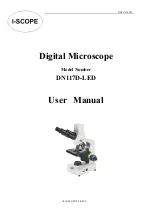
DN117D-LED
I-SCOPE OPTICS JAPAN
7
②
①
Fig.6
Fig.5
2.2.3 Installing objectives (Fig.5& 6
)
1. Adjusting the coarse focus knob until the
support device of the mechanical stage
reaches its low limit position.
2. Screw the lowest magnification objective
into the nosepiece from the left or the right
side, then revolve the nosepiece clockwise
and mount other objectives by the sequence
of low to high magnification
Installing objective this way will make the
change of magnification to be easier during
using.
Clean the objectives regularly, for lens is
susceptible to dust.
When operating, use 10
×
magnification
objective to search and focus specimen
firstly,
then
replace
with
higher
magnification objective if necessary.
When replacing the objective, slowly turn
the nosepiece until you hear “clicked”,
which means the objective is in the
required position—center of the light
path.
2.2.4
Installing the color filters (Fig.7)
1. Turn the condenser bracket
①
out at the
direction of arrow in Fig.7
2
.
Put the required filters
②
into the holder on
the bracket, and then turn the bracket back
to the right position.
★
Baby blue and green filters are available in
standard outfit.
Fig.7





































